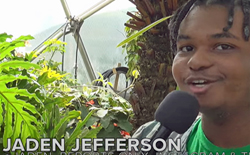Perrysburg students learn about science, economics of climate change
Toledo is already experiencing 21 summer days hotter than average because of climate change, and the number is only expected to increase, Perrysburg High School students were told during an Earth Week presentation Tuesday.
Hosted by the Perrysburg Country Garden Club, the program was part of the national lecture series C-Change Conversations, a nonprofit that describes its outreach efforts as “nonpartisan, science-based talks in climate change education.”
Tuesday’s discussion was led by Kathleen Biggins, president of C-Change Conversations.
Ms. Biggins, who hails from Princeton, N.J., offered an in-depth perspective on a complex issue: what drives climate change, what the next generation can expect as our planet grows hotter, how climate change will affect the economy, and how students can set a path for themselves going forward.

C-Change Conversations presents to students at Perrysburg High School. The Blade/Rebecca Benson
“I learned that we’re actually taking a lot more steps to battle climate change than I initially thought,” said Averi Perkins, a senior at Perrysburg High School. “It’s not necessarily just recycling anymore, but creating new inventions to battle climate change.”
Among the inventions highlighted were clean hydrogen fuel, molten-salt thorium reactors, and even the use of nuclear fusion to create an artificial sun. Although many of these ideas are not new, they are becoming more advantageous for businesses to implement as the economy gradually shifts away from fossil fuels and toward alternative energy sources.
In addition to the University of Toledo, several large corporations, including Deloitte, Fifth Third Bank, KeyBank, Bank of America, Merrill Lynch, and U.S. Bank sponsored the talk.
Other corporate sponsors included The Andersons, a producer of ethanol and other biofuels, insulation company Owens Corning, and Phoenix Technologies, a subsidiary of the plastic manufacturing giant APG Polytech.
“Humans are pumping carbon into the atmosphere at the alarmingly fast rate of 40 billion pounds every single year, which is much faster than what normally happens in nature,” Ms. Biggins said. “The problem is serious, but the solutions to make the future much better are still viable if we reach for them.”
The talk inspired students like young Perkins to become more involved in raising climate change awareness in the world around her.
“I feel like it’s going to be a lot easier for me to broaden my scope,” she said. “As of right now, I feel like I do a lot in terms of recycling and being environmentally conscious, but also encouraging other people and institutions to be more climate-conscious.”
The solution?
Talk about it, learn about it, and come together about it, Ms. Biggins said.
Students were encouraged to become climate leaders, be involved in their community, buy from companies that are “leading,” remember to vote once they can, and educate themselves for the future.
“Climate change is something that’s pretty present in the way I run my life,” said Ana Claire Munger, a senior who attended the talk. “Now that I’m able to vote, it’ll definitely be with me when I’m voting.”



